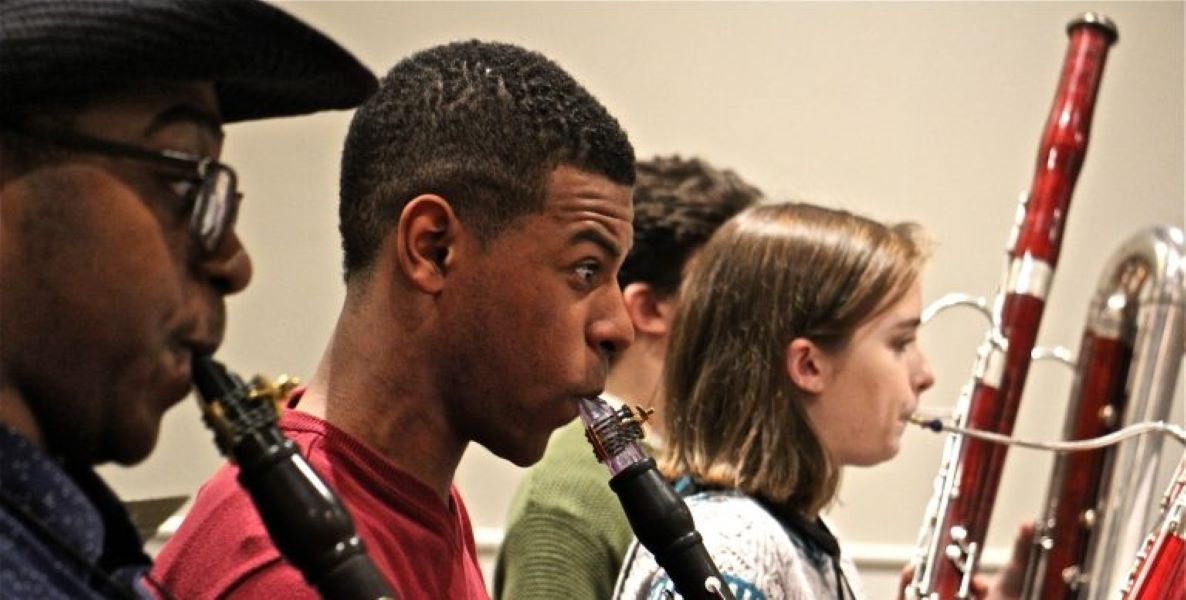Project 440 takes its name from an audio frequency of 440 hertz, which is equivalent to pitch “A,” the note orchestral musicians use to tune their instruments pre-performance. It makes sense a nonprofit organization with that name would be music-related.
But Project 440 is unique in its mission. It doesn’t offer music lessons or seek funds for sheet music or instruments. There are no Project 440 concerts. There are no other music programs it’s intentionally modeled on.
Instead, the organization’s largest program, Doing Good, teaches the basics of entrepreneurship, how to run a business, and life skills, by encouraging young musicians to merge their love of music with ways they want to improve their communities.
“Music is wonderful, but it is not the point of Project 440,” says co-founder Joseph Conyers. “The point of Project 440 is to figure out how can we make better citizens, better young people, by opening up the possibilities of their life through a passion that they have. In this case, that’s music.”
Musicians as entrepreneurs, community contributors
The program’s participants come from Philadelphia public and charter high schools. Since the 2017-2018 academic year, about 100 students have completed Doing Good.
In order to graduate, students must present viable concepts that align with the program’s mission. Among the ideas from the 2022 class: Healthy Helpers, neighborhood trash pickups featuring musical performances; and Music for Mental Health, which wanted to create a music therapy program for students in grades 6 to 12.
The program is about getting participants to think of ways they can give back to their communities through music. The type of music — orchestral, rock, rap, reggae — doesn’t matter. Giving back, finding your path, does.
Graduates are not required to turn their ideas into full-fledged service organizations — but some have anyway. Center City Chamber Orchestra, which seeks to diversify the orchestral music world, and Generation Music, which introduces very young students to classical instruments, both grew out of Doing Good.
To Conyers, the program is more about getting participants to think of ways they can give back to their communities through music. The type of music — orchestral, rock, rap, reggae — doesn’t matter. Giving back, finding your path, does.
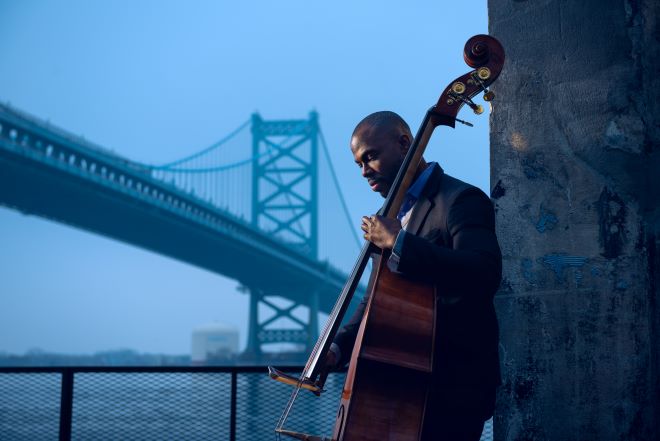
“We plant a seed in a young person’s life; they plant a seed in someone else’s life through the work they’re doing, and it ends up having a larger ripple effect,” says Conyers, who is also a member of Project Good’s board of directors and the Philadelphia’s Orchestra’s acting associate principal bass. “How can we take that passion for music and make change in our communities?”
How the music started
Conyers and two musician friends from the Savannah Symphony Orchestra founded Project 440 in 2007. The orchestra had disbanded (the Savannah Philharmonic Orchestra was founded in 2009), and the trio wanted to fill the city’s musical void. Inspired by the support and mentorship they’d received from orchestra musicians when, as high schoolers in Savannah, they’d volunteered as ushers, Project 440’s first project was performing at area libraries and schools. In one four-day stretch, they played at 16 community centers.
Each performance included an instrument petting zoo, for young people to touch and try donated violins and cellos. Project 440 also provided information about music shops, teachers and performing opportunities.
“Why can’t success in music be a gateway to become whatever we want to be? It offers the same transferable skills,” says Joseph Conyers.
“We wanted to ignite a spark by being there,” Conyers says, “being a touchpoint, not knowing if it would lead them to a life in music or anything like that.”
When Conyers, a graduate of the Curtis Institute of Music, returned to Philly in 2010 to join the Philadelphia Orchestra — the first African American to join the Philadelphians since 1974 — he brought Project 440 with him.
“I recognize that I am one of very few Black musicians, not only now, but in the history of the institution,” he says. “Whether I want this on my shoulders or not, I have a responsibility to take a leadership role and to be a role model.”
He soon realized he would need to broaden his organization’s community engagement.

The music students he met and his own experiences in schools showed him the city’s public schools had a vastly under-resourced music program — and a shortage of guidance counselors. He worried students wouldn’t realize that they could have lives in music after their formal education ended.
“There’s always this idea that if you’re going to go into music, you are going to play at Carnegie Hall. That’s the one and only goal,” says Conyers, “What I want to do with Project 440 is say, No, there’s so much more.”
In 2015, Conyers took on the additional role of Musical Director of the All City Orchestra. “I’d never conducted before, but I do love teaching, and I thought it was important that young people saw representatives of themselves in these leadership positions and know that it’s a possibility,” he says.
Conyers compares music to sports in terms of what it can bring to someone’s life: Few players get to go pro, but the rest learn teamwork, commitment — and simply have fun.
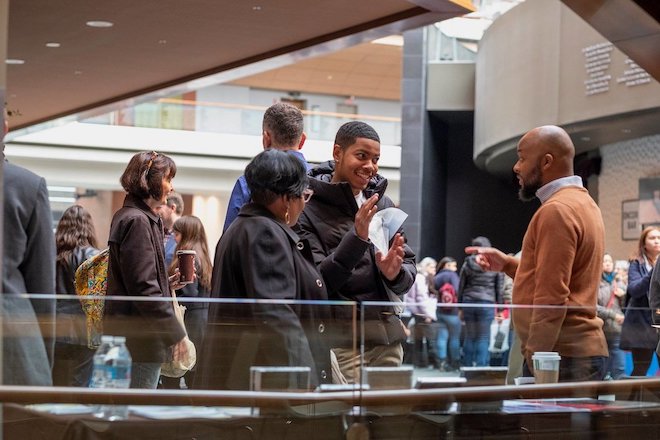
“Why can’t success in music be a gateway to become whatever we want to be? It offers the same transferable skills,” he says. “That makes the case for music education with a broader audience, because people understand that these are transferable skills.”
And so, in 2017, Project 440 morphed into its current formation. It now has three main programs: Doing Good; Instruments for Success, a 10-week course focused on college preparedness, including helping with school selection, financial aid, and auditions; and the Youth Advocacy Council, which allows Project 440 alumni to learn about advocacy and governance from city leaders.
It also hosts a free annual college fair; the 2022 fair is scheduled for June 4 from 10am to 4 pm at the Kimmel Center and is open to students, family members, educators, musicians and non-musicians.
Susanna Loewy, the organization’s program director and lead teaching artist, says music sparks positive change by bridging barriers.
“Music is a universal language that speaks to people through history and ethnic backgrounds and political preferences,” she says. “One of the first questions we ask in a [Doing Good] class is why we love music. A lot of them say, It’s there when people aren’t, or, It speaks through the silence. Such beautiful responses that are poetic but also true.”
A group targeting literacy thought of holding concerts where the admission price was a book for a school without a library. Another wanted to incorporate a lesson in playing bucket drums with street cleaning. Yet another sought to create safe spaces in school with appropriate music to allow students to chill after a stressful class.
The first half of Doing Good’s semester-length after-school program gets students thinking of ways they can give back by using music, and offers rigorous training in leadership and entrepreneurship. The classes then divide into groups to create their own service projects. They note what existing agencies are already doing and consider what would help or enhance those programs.
After pitching their concepts to a group of industry professionals à la Shark Tank, each group receives $500 and staff support to implement their ideas.
Each project is unique: A group targeting literacy thought of holding concerts where the admission price was a book for a school without a library. Another wanted to incorporate a lesson in playing bucket drums with street cleaning. Yet another sought to create safe spaces in school with appropriate music to allow students to chill after a stressful class.
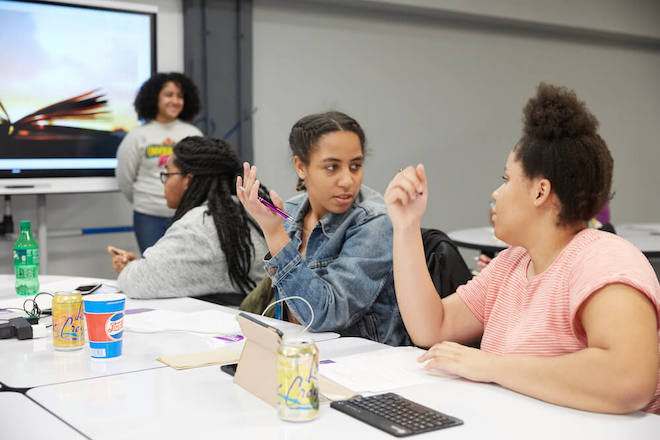
“I’m not saying the wheel needs to be created with each and every project, but they do have to make the project their own,” Loewy says. “Sometimes they want to take on the world, the whole city. We guide them and sometimes help scale back.”
Loewy also enjoys demonstrating that music offers multiple career opportunities. A flutist, she too grew up believing her only job option was performing in an orchestra. She’s since learned that’s not true. In addition to Project 440, Loewy is a performer, music festival organizer and a college-level instructor.
“My career exemplifies what we’re trying to teach: There are a vast variety of careers available to 21st-century musicians,” she says. “You can really form your own path these days — and that’s exciting.”
Where the music is going
In 2022, at the urging of Doing Good graduates, the organization launched an advanced class called — wait for it — Doing Good II, which offers lessons in quantifying results, applying for grants, raising money and other relevant issues. Its curriculum is evolving.
The first Doing Good II class included Philadelphia High School for Creative and Performing Arts (CAPA) students Claire Casanova and Chloe Cooper. After completing the first Doing Good, the pair founded Generation Music in 2018 with the goal of exposing underserved youth to classical music.
They launched the project by visiting Philadelphia elementary schools and giving lessons on pop culture’s ties to orchestral music. They showed clips of SpongeBob SquarePants with music by Rossini, Leoncavallo, and Tchaikovsky. They played Flight of the Bumblebee, written by Nikolai Rimsky-Korsakov in 1900, arguably one of the world’s best known orchestral interludes.
“It’s like, See, you already know so much. Now you’re a little bit smarter about it because you know its name and who it’s by,” says Casanova, who now attends Temple University. “It’s bridging the gap.”
For her part, Cooper, who attends the University of Miami, says, “I still use the things I learned in the scope of [Doing Good],” like budgeting.
Although temporarily derailed by the pandemic and other factors, Generation Music is still going strong, currently planning for an already sold out summer program for students ages 6 to 12 at a day camp run by a West Philadelphia church.
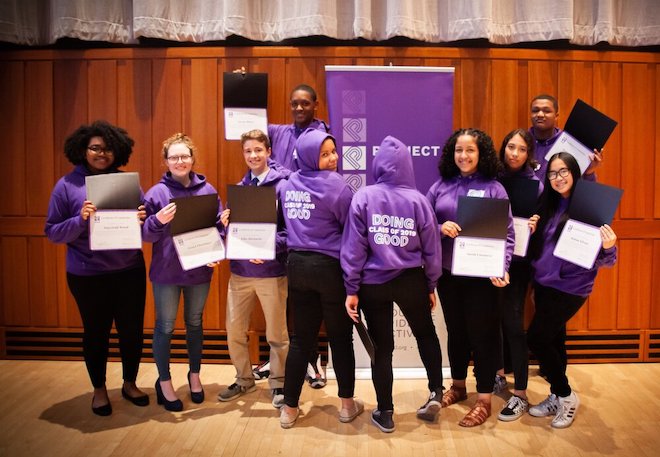
Marquise Lindsey-Bradley, a 2019 CAPA and Doing Good graduate, went on to co-found the thriving, youth-run Center City Chamber Orchestra with his program partners, including Doing Good II students Davey Hiester and David Ortiz. Although Lindsey-Bradley has since left the organization to attend the Cleveland School of Music and Case Western Reserve University, he says Project 440 helped define and clarify his goals as a musician.
“Everything we learned seemed to have a very clear connection to what we’d be doing down the road,” he says.
That’s why he decided to give back to the program financially: Lindsey-Bradley is the first former participant who is also a donor.
“You learn a lot about an organization when you’re on both sides, when you’re a participant and a leader. I saw my donation as an opportunity to confirm that this is something I believe in,” he says. “This is how we sustain the good that is in the world.”
Corrections: A previous version of this story misstated the location of the elementary schools where Claire Casanova and Chloe Cooper launched Generation Music: The schools were in Philadelphia, not Savannah. The previous version also stated that the Center City Chamber Orchestra was co-founded by Joseph Conyers: Its founders included Marquise Lindsey-Bradley, Davey Hiester and David Ortiz.
![]() MORE STORIES ON HELPING PHILLY STUDENTS FROM THE CITIZEN
MORE STORIES ON HELPING PHILLY STUDENTS FROM THE CITIZEN



